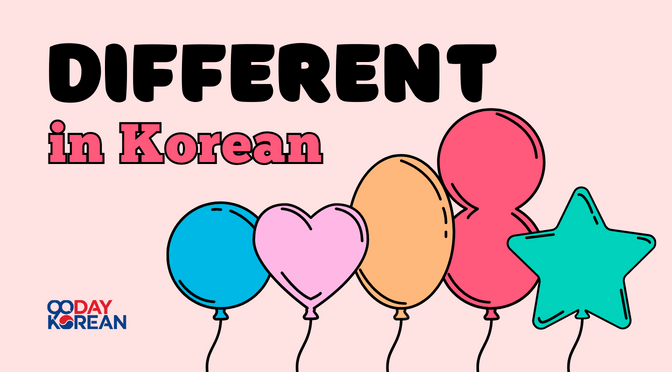Perhaps one reason why you’ve ended up in Korea – or are currently planning for your trip there – is because you’re tired of everything in your life being the same. Seeing the same streets every day, eating the same foods every week, going to the same clothing stores every month. Sometimes you simply want to be somewhere new and different, trying something new and different.
To follow that theme, today is the perfect day to learn how to say different in Korean! What makes this lesson even better and more special is that the word “different” just so happens to be a rarer word to be taught!
Contents
“Different” in Korean
The basic form for how to say different in Korean is 다르다 (dareuda). This is not the only word for it, but it is the most general one. As adjectives in Korean are considered more like descriptive verbs, you need to separate the stem from the -다 (-da) to use the word. Thus, to actually say the adjective “different” in Korean, you need to remove the -다 (-da) and add -ㄴ to the stem instead, forming the word for “different”: 다른 (dareun).
If you wish to use the word as a descriptive verb at the end of the sentence, you can use it much similarly to action verbs, by attaching present tense, past tense, and so forth to the stem, for example, using the past tense to form the meaning 달랐어요 (dallasseoyo) aka “it was different.”
차이가 나다 (chaiga nada) also means “different” and is synonymous with 다르다 (dareuda). The biggest difference between the two is that 차이가 나다 ( chaiga nada) is used and conjugated the way action verbs would be, as opposed to an adjective or a descriptive verb.
Check out this article on Korean Grammar for Beginners to learn the basics of Korean Grammar.
Sample sentences
한국문화와 일본문화는 어떤 면에서 제일 크게 차이가 나세요? (hangukmunhwawa ilbonmunhwaneun eoddeon myeoneseo jeil kheuge chaiga naseyo?)
In which parts do Korean culture and Japanese culture differ the most?
영어와 한국어는 크게 달라요. (yeongeowa hangukeoneun kheuge dallayo.)
English and Korean are significantly different.
결국에는, 그 남자가 내 생각과 되게 달랐어. (gyeolgukeneun, geu namjaga nae saengkakgwa dwige dallasseo.)
In the end, that guy was very different from what I thought.
All of these words also mean “different,” however they have slightly different connotations and usages. Once you’ve familiarized yourself with the usage of 다르다 (dareuda), these may be nifty additions to your vocabulary!
| Korean | English |
|---|---|
| 색다르다 (saekdareuda) | different, unconventional |
| 분분하다 (bunbunhada) | different, diverse, divergent |
| 이질적 (ijiljeok) | different, disparate |
| 구구하다 (guguhada) | different, varied, diverse |
A word of caution about Romanization
While it is possible for you to study the words in this article simply by reading their romanized versions, it will come in handy for you to be able to read Hangeul if you ever wish to come to Korea. Hangeul is the Korean alphabet, and not difficult to learn. In fact, you can learn it in just 90 minutes.
After you’ve familiarized yourself with Hangeul, life in Korea will suddenly seem so much easier, and the country won’t appear so foreign to you. So, if you’re serious about learning Korean, why not learn Hangeul today?
Wrap Up
So now that you understand the difference, what word would you like to learn next? Let us know in the comments below!
Photo Credit: BigStockPhoto






